Balancing work, personal development, social and romantic life is becoming increasingly challenging for Chinese people due to the fast pace of the modern environment. This leaves a lot of singles without life partners, especially in big cities. Recent data released by China’s Ministry of Civil Affairs reveals that the rate drastically decreased from approximately 13.5 million couples in 2013 to 6.8 million in 2022. With the high levels of stress from work and social pressure, they have no time to cultivate relationships with friends nearby but only keep themselves immersed in work every day. That opens a lot of new opportunities for dating apps in China.
Download our report on Gen Z consumers
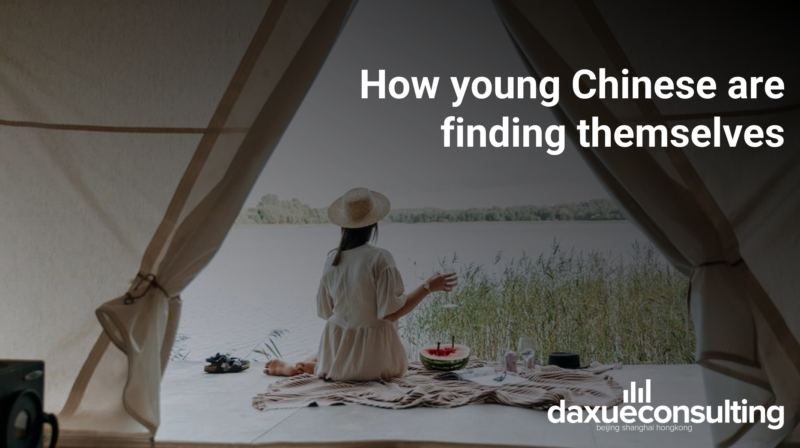
The modern setting of romantic relationships in China
Because of China’s rigorous college entrance examination, dating is not common among high school students. They simply have too much work to do, in addition to dating being looked down upon by family members. In general, Chinese students leave high school with a lot less romantic experience than their Western counterparts. For a lot of Chinese people, serious dating starts after they’ve finished school.
More so than Westerners, many Chinese view dating as a pragmatic affair and potential marriage arrangement. Young Chinese adults are often under pressure to find a good husband or wife and get married relatively early. This pressure is particularly acute for women if they pass the age of 26-27 without finding a husband. Men can find themselves similarly ‘left-over’ if they wait too long to get married.
As a reasonable bounce back to this pressure, the number of people who choose solitude steadily increases. Interestingly, the motivation varies between genders. Out of 631 participants in the Aurora mobile survey more than 40% of females opposing 25% of males choose to be single for the sake of life enjoyment. The other reasons that have been listed were job and academic development, priority towards smaller social circles, and lack of financial resources for marriage and romance.
Gender imbalance in Chinese dating
Demographics are a significant concern for China’s policymakers, primarily due to the country’s aging population and an imbalanced gender ratio. In 2022 China had more than 30 million men than women, a reflection of the country’s one-child policy.
The gender imbalance is making it hard for many men to find a partner – and the gap is bound to widen. On average, 118 boys are born for every 100 girls in China, compared to the world average of 103 to 107, respectively. The race to find a suitable partner has led men to go to great lengths to find a wife. The longstanding tradition of meeting a potential partner has given way to modernity. Online dating is growing fast, giving impetus to the development of the dating industry in China.
Late marriages are becoming more common
The statistics of Chinese local civil affairs departments show a rise in the age of marriage among Chinese urbanites. Looking at the historical trajectory, starting from 1986, when it was 22.83 years old, the marriage age began to rise. Jumping to 25 years old in 2011, 26 years old in 2014, 27 years old in 2017, and 28 years old by the end of 2020. Nowadays, the average age of first marriage in some places is even exceeding the 30-year-old mark. It be explained by the improvement of the educational level, intensified social competition and work pressure, and the rising costs of marriage and living. Generally, people reshaped their perception of marital life. Official marriage is no longer the only way to declare one’s commitment and seriousness of intentions.
The emerging demand for love-related content
Despite all, the desire for love did not fade away. The number of views on videos about love skills on the online platform Bilibili exceeded 100 million in 2021. Dating websites, apps, and other corporate giants quickly saw this market opportunity and have already acquired a large customer base.
Chinese dating TV shows and media love experts
Beyond dating websites and dating apps in China, dating TV shows are becoming more and more popular. According to CBNdata statistical report nearly 20 love variety shows are being broadcasted and competing to satisfy the audience’s love cravings by the end of 2022. A similar rise can be spotted for the emotional reality shows, rising from 21 major launches in 2020 to 27 launches in 2021.
One of the most successful competitors in the field is Heart Signal (心动的信号), reaching million views and staggering search volume on media platforms like Douyin, Fei Cheng Wu Rao (非诚勿扰), getting audience vies up to 50 million per episode, and A Journey for Love (怦然再心动), featuring in details all stages of love development.
The other phenomenon is dating online coaches and love advising platforms. The marriage and love expert “龙飞律师” (Lawyer Long Fei) has been operating on Douyin with more than 9 million followers, 10,000 likes for one-on-one videos, and an average of 30,000 streamers in live broadcasts. She easily connects with her audience by telling real-life stories about her husband, divorce experience, and self-motivation techniques.
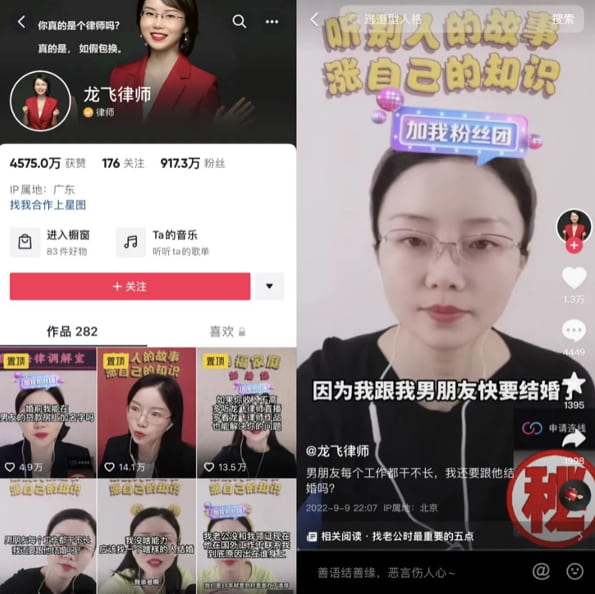
These interesting trends suggest that Chinese consumers are looking to get involved in dating, but cannot do so for different personal and social reasons. Thus, they are looking for entertainment to experience something that they themselves cannot experience.
Finding love in the age of technology
Download volume of dating apps has been increasing year by year
As dating apps have become more effective around the world, online dating has gradually evolved into a global phenomenon. Gen Z gives the preference towards online dating due to the comfortable and relaxed setting, a low-cost and high-efficiency way to approach potential partners, and time optimization.
In the 1st half of 2021, the cumulative number of active users of China’s dating platform reached 36.6 million, an increase of 19.9% compared with the same period in 2020. Similar growth was reached by China’s Internet Marriage and Dating Market in 2021 which reached RMB 7.2 billion.
The trend of interaction with strangers online accelerated in China from the 2010s with the arrival of dating apps like Tantan and Momo. Together with the new app Soul, they became the most popular dating apps in China, reaching over 100 million monthly active users in total.
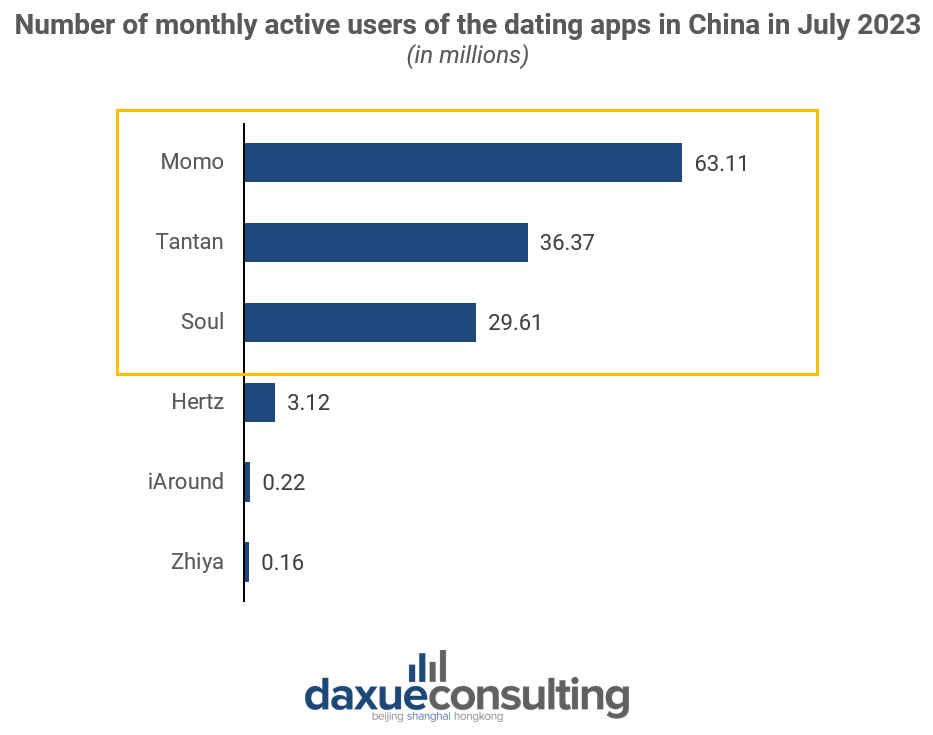
The position of China’s dating apps became so solid, that Tantan and Momo ranked in the 4th and 10th position of the most frequently downloaded dating apps worldwide in the 1st half of 2021. Acquiring together 14.1 million users.
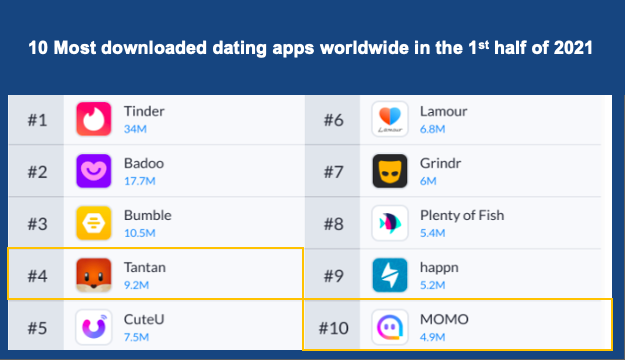
Different Chinese dating apps for different generations
Zhenai app adopting the traditional offline blind date model targets middle-aged and high-income white-collar workers in China.
Such dating apps as Momo and Tantan focus on Chinese Gen Z users. Their focus goes beyond the physical appearance of the profiles. Spotting this shift, apps have started incorporating innovative features (trend tags), hobbies, and personalities as the foundation for social interaction.
Additionally, cloud dating platforms adopt the online live blind date method, adding matchmaker elements. Their user group is mainly young people.
Chinese dating apps are getting diverse
Momo (陌陌)
Momo is the leading Chinese dating app. In recent years, the app has transitioned to provide its members with a wide range of features. Its ecosystem of “mini programs” enables users to shop, order food, play games, hail rides and make payments. Tencent recently launched three functions at Momo: an anonymous video dating app called Maohu (“Catcall”), a Tinder-like app called Qingliao (“Light Chat”), and a reboot of its Pengyou (“Friends”) app.
In September 2020, Momo Master App had 113.6 million monthly active users, and during the third quarter of the same year, the total number of paying users for Momo’s live broadcast and value-added services was 13.1 million, including 4.1 million paying users.
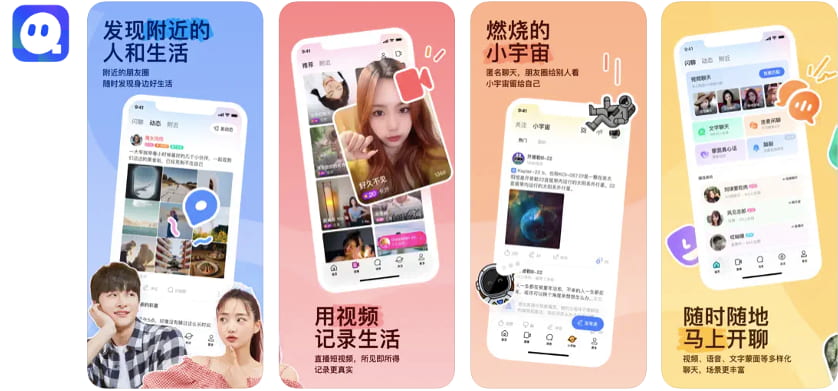
Tantan (探探)
Following Momo, Tantan emerges as the second most popular Chinese location-based dating app. Tantan closely mimics Tinder’s design, utilizing the familiar left or right swiping function for user engagement and allowing matched users to initiate a conversation. Premium membership unlocks additional features, mirroring Tinder’s monetization approach.
The app doesn’t have special restrictions or demands from the users. That’s the reason why Tantan is so popular in China – almost anyone can use it without burdens or labels. It’s a platform for arranging casual dates, not necessarily for meeting your future spouse.
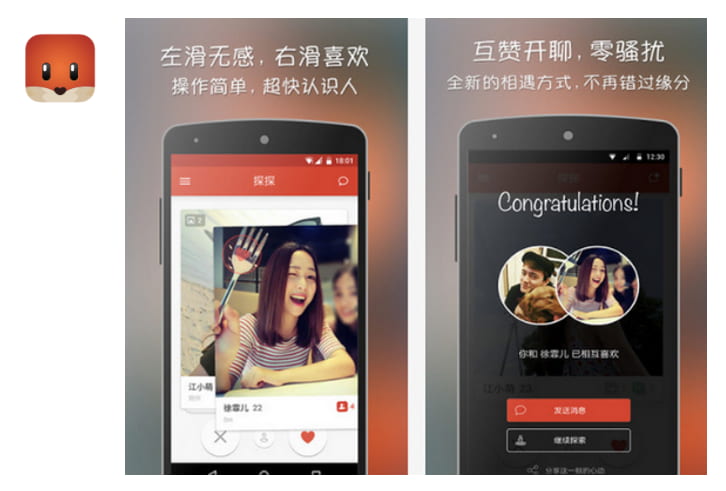
Soul
On the rise of the meta-universe, Soul is another dating app rapidly acquiring market positions. Young Chinese users are the core group of Soul’s audience, accounting for 74.9% of monthly active users in 2021. In the same year, the total number of users of Generation Z mobile social networks was 330 million, and the market size reached RMB 93 billion.
Soul, focusing on young demographics, incorporated innovative features like image-less matching, personality tests, and meaningful interactive activities. The strategy paid out, and the platform demonstrated extensive growth from 2019 to 2021, surpassing 50% monthly and daily user growth rates in 2021, with an impressive average daily user engagement time of 45.3 minutes.
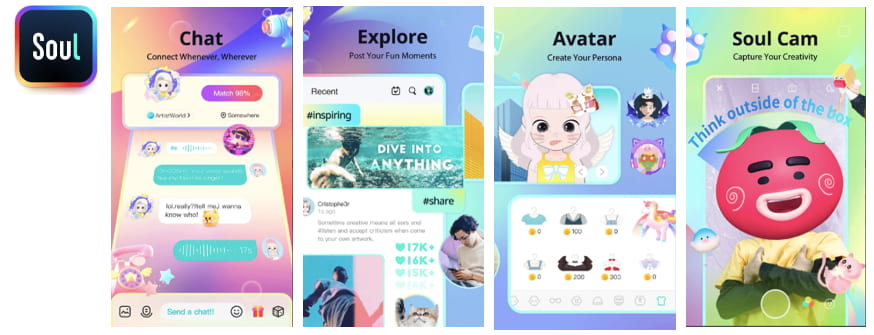
Largest variety of needs on the dating market
Dating apps in China offer a diverse range of platforms catering to various dating preferences. QingChiFan (请吃饭) focuses on meal invitations as a natural way of dating. Baihe (百合) is targeted at individuals seeking serious relationships, emphasizing verified profiles with detailed information akin to job resumes. Blued stands out as the foremost dating app for the LGBTQ+ community in China, providing extensive networking opportunities, while also implementing privacy measures such as disappearing chat photos and no screenshot capabilities. Each app brings a unique approach to dating, addressing different needs within the Chinese dating sphere.
What brands should know about the dating app market in China
- China’s modern lifestyle, high work stress, and social pressures have led to a significant decrease in the number of couples, with more people choosing solitude due to various personal and social factors.
- The gender imbalance in China, with more men than women, has made it challenging for many men to find partners, leading to a growing interest in online dating.
- Late marriages are becoming more common in China, with the average age of first marriage steadily increasing, driven by factors such as education, work pressure, and rising marriage costs.
- Despite societal pressures, the desire for love remains strong among Chinese consumers, and they are turning to entertainment, dating apps, and love-related content to fulfill their romantic desires.
- Dating apps in China, such as Tantan, Momo, and Soul, have gained popularity, offering a range of features and catering to different generations and preferences.
- China’s dating market is diverse, with apps like QingChiFan for meal-based dating, Baihe for serious relationships, and Blued for the LGBTQ+ community, reflecting a variety of needs within the Chinese dating sphere.




